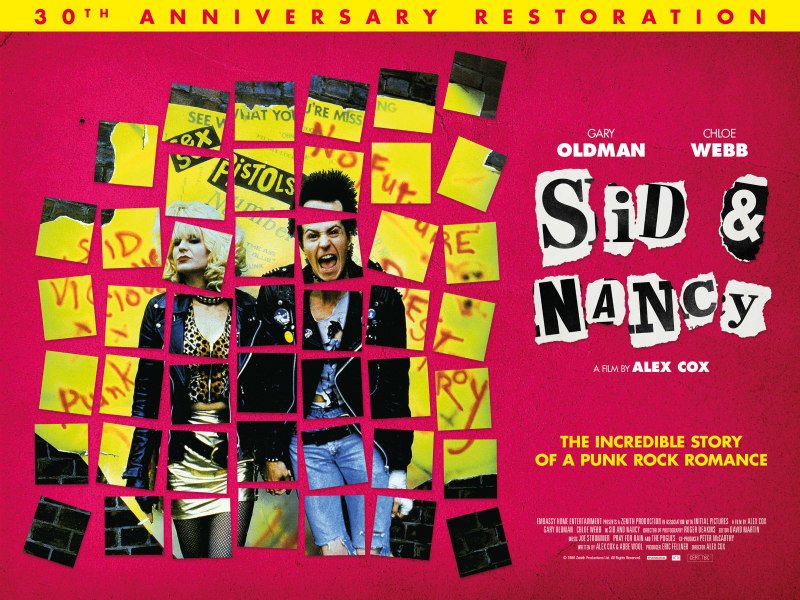Review: Alex Cox’s Sid & Nancy re-released on its thirtieth anniversary
August 16, 2016

Punk Rock’s most enduring legacy may be its impact on filmmaking. While the music and fashion coagulated into pantomime, the films that attended the movement may be the best expression of the disaffection felt by its founders. The injunction to ‘do it yourself’ was taken up with gusto by filmmakers like Derek Jarman, Don Letts and Julian Temple, who captured Punk’s nihilistic rage in films like Jubilee (1977), The Punk Rock Movie (1978), The Great Rock ‘n’ Roll Swindle (1979), and Rude Boy (1980). But Alex Cox was the most singular cinematic voice to emerge from Punk. Cox became a household name to cineastes with his erudite and insightful introductions to films for BBC’s Moviedrome (1987-1994). But he should be remembered as the mind behind Repo Man (1984) and Walker (1987).
Cox was initially ambivalent about the prospect of making a biopic about Punk’s star-crossed junkies, but chose to pursue the project in order to forestall a proposed Hollywood treatment of the Sid and Nancy mythos starring Rupert Everett and Madonna. In this desire to take ownership of Vicious and Spungen, Cox divests the story of the tawdry romance that clings to their emaciated frames – though Cox himself believes the film ultimately fails in this aim. As well as being a rumination on how Punk lost its way, the film’s original title and eventual tagline, Love Kills, give some indication of the film’s thesis. To mark its thirtieth anniversary, Sid and Nancy has been re-released with a new print which serves as a reminder of just how much we need Alex Cox, and a rebuke that no room exists for his unique talents.
 Cox transmutes the story of the Sex Pistols’ outrageous rise and calamitous fall into a Gothic romance, a tale of doomed lovers wrapped in the embrace of Thanatos. The film’s second half details Vicious and Spungen’s descent into drug hell: when the couple hunker down in the infamous Chelsea Hotel and life shrinks to the pinprick of the next fix. Capturing the lassitude and mania of the addict’s life, it is one of the most authentic depictions of addiction committed to the screen. Its influence can be felt in everything from Trainspotting (1996) to Requiem for a Dream (2000). Equally, Cox’s rendering of the Punk scene comes with a degree of personal insight and empathy towards the various lost souls who gravitated towards the Pistols. These are not the usual spiky-haired ciphers, but an alliance of the alienated.
Cox transmutes the story of the Sex Pistols’ outrageous rise and calamitous fall into a Gothic romance, a tale of doomed lovers wrapped in the embrace of Thanatos. The film’s second half details Vicious and Spungen’s descent into drug hell: when the couple hunker down in the infamous Chelsea Hotel and life shrinks to the pinprick of the next fix. Capturing the lassitude and mania of the addict’s life, it is one of the most authentic depictions of addiction committed to the screen. Its influence can be felt in everything from Trainspotting (1996) to Requiem for a Dream (2000). Equally, Cox’s rendering of the Punk scene comes with a degree of personal insight and empathy towards the various lost souls who gravitated towards the Pistols. These are not the usual spiky-haired ciphers, but an alliance of the alienated.
When casting Sid, Cox was faced with the choice between Gary Oldman and another emerging young theatre actor called Daniel Day-Lewis. Following his breakthrough performance in Meantime (1984), Oldman’s Sid solidified his standing as a major cinematic force, bringing a fiery intensity and commitment to the role, but also underscoring that Vicious was fundamentally a vulnerable soul seeking a mother substitute. Not to be outshone, Chloe Webb delivers a beautifully wounded performance which finds the tragic dimension of the outwardly unlovable Spungen. Andrew Schofield gives an unerring take on John Lydon’s jaded, sarcastic persona, playing him like a spurned lover who watches his old friend slip away, while David Hayman plays Malcolm McLaren like a Situationist cult leader with Sid as his ‘fabulous disaster’ who ’embodies the dementia of a nihilistic generation’.
The new print brings out the brilliance of Roger Deakins’ cinematography, which lends equal poetry and grandeur to London’s corroding skyline, the seeping squalor of New York and the iconic vistas of America’s heartland. As with the rest of Cox’s oeuvre, there is a heightened quality to Sid and Nancy which presages the postmodern, cine-literate sensibility that would become a fixture of ’90s indie cinema. Cox seems to have been fatally ahead of the curve in his dismantling of genre tropes. The intervening thirty years have done little to diminish the potency of Sid and Nancy. It is a brutal, beautiful piece which set the template for the modern music biopic, painting an impressionistic picture of a life. In this age of anger and collapse, with the smell of rebellion in the air, Sid and Nancy returns at an opportune moment. The times may finally have aligned with the ‘healthy anarchy’ of Alex Cox.
The film is out on special edition DVD and Blu-ray on August 29th.
Follow Daniel Palmer on Twitter at @mrdmpalmer.




Comments